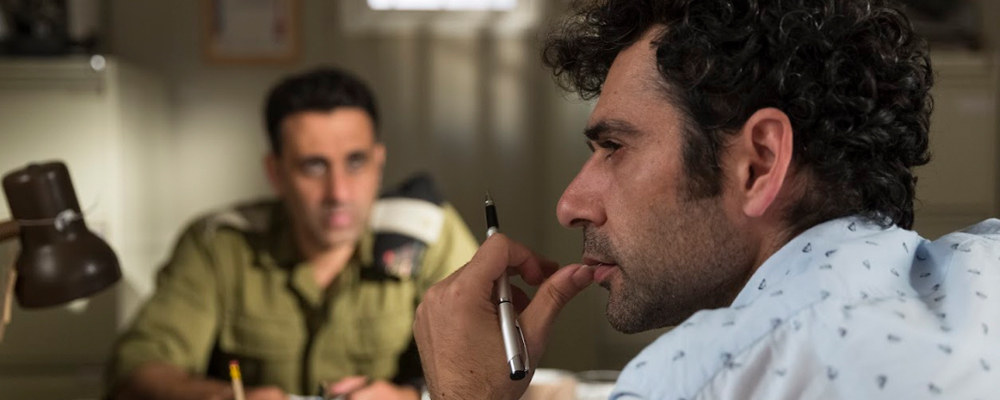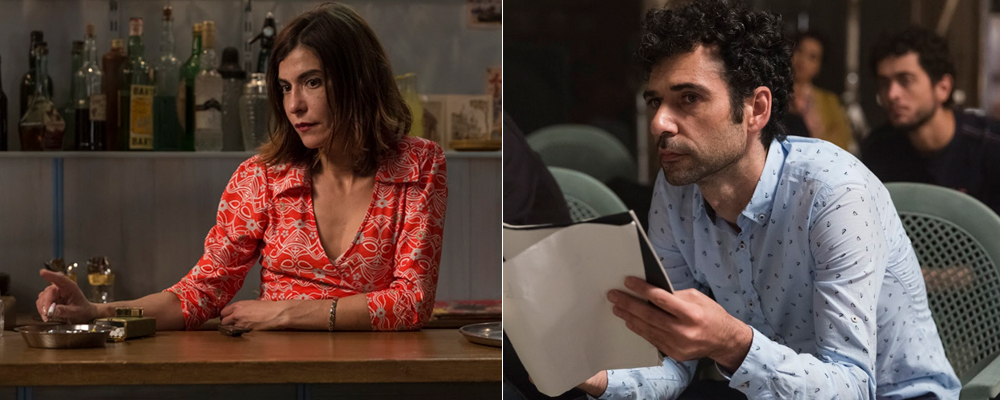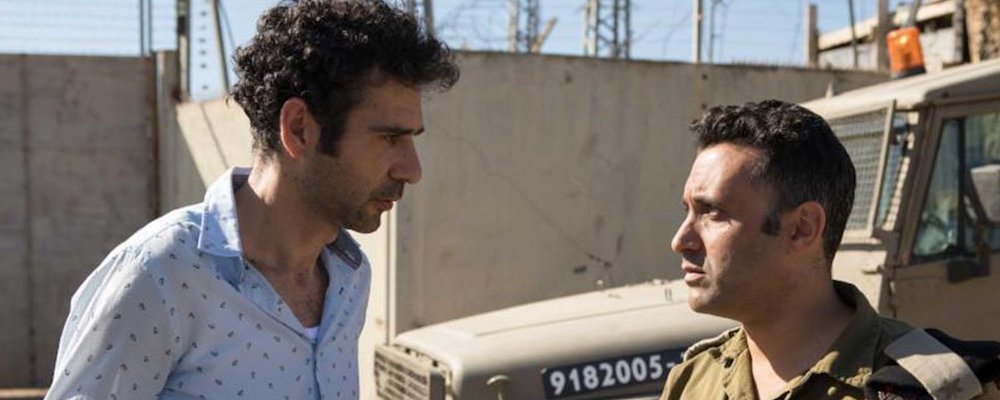‘Tel Aviv on Fire’ Frames the Israel-Palestine Conflict as a Comedic Soap Opera
Alci Rengifo
The Israel-Palestine conflict would be the last subject most viewers would think of when considering the idea of a comedy. But with “Tel Aviv on Fire,” director Sameh Zoabi has managed to make a film both enlightening and rousingly funny about one of the world’s most divisive issues. By using the aesthetic of a soap opera Zoabi is free to touch on hot button words, points of view and history without seeming confrontational, yet still brimming with clear and daring points. It’s almost like it takes melodrama to look at such an issue soberly.
Salam (Kais Nashif) is a Palestinian getting coffee for his TV producer uncle Bassam (Nadim Sawalha) in the West Bank. Bassam runs a hot soap named “Tel Aviv on Fire,” which is watched by both Israelis and Palestinians and takes place during the Six Day War of 1967. The show’s big star is Tala (Lubna Azabal), who plays a Palestinian underground agent seducing an Israeli military official. While driving through an Israeli checkpoint, Salam is interrogated by Captain Assi Tzur (Yaniv Biton). He talks his way out of the situation by claiming to be a writer for “Tel Aviv on Fire” which as it turns out, is the favorite show of Assi’s wife. The captain gives Salam tips to make the military characters more convincing and it ends up landing Salam a job on the show’s writing staff. Now tasked with producing more content, Salam starts using Assi as a secret consultant. Both men begin to not only develop a friendship, but also realize how they see the situation from both ends of the conflict that defines their societies.
“Tel Aviv on Fire” works on some very distinct levels. It’s a feel-good romance, with Salam trying to win the affections of neighbor Mariam (Maisa Abd Elhadi) and beginning to impress her with his new identity as a writer. It’s also a sharp work of political cinema, using comedy to ask hard questions about the Israeli occupation of the West Bank and why Israelis and Palestinians must find bridges to each other as neighboring peoples or risk further catastrophe. The silky soap opera sequences hide commentary within its dramatic language, as when Salam proposes that Tala’s character marry the Israeli soldier, which of course sparks hostile reactions all over. Salam’s relationship with Assi turns into a real collaboration for the show’s scripts, and Assi begins to have fun impressing his wife with his side gig. But when it comes time to draft the season finale, both men’s opinions on what should happen reveal their biases.
Zoabi, a Palestinian citizen of Israel, recently sat down with Entertainment Voice to discuss the laughs and very serious matters of “Tel Aviv on Fire.”
“The idea came from a collection of things that happened in my life as a filmmaker,” said Zoabi. “My first movie was a comedy called ‘Man Without a Cellphone,’ it dealt with a Palestinian living inside Israel, it was a small feature but did super well with audiences in festivals. It made me wonder if I should do another comedy because funny enough, a criticism I got was that it wasn’t enough arthouse! It was entertaining and entertaining without a star kind of lives on its own. It’s a hard film to sell to Europeans. Just go to Cannes, it’s all serious, serious movies. But as a Palestinian filmmaker, because we’re so used to being seen as victims, writing a comedy makes it something strange when looking for distribution. And of course we should be able to write about anything, not just the fighters.”
Zoabi speaks Hebrew and Arabic fluently, he studied in Tel Aviv and so he decided to apply for support from the Israeli Film Fund. This brought about its own challenges. “I was under the microscope, because Israelis give the money but are always wondering ‘uhm, I hope he’s not too pro-Palestinian,’ but then the Palestinians are wondering ‘is he a sell out? Is he making films to appease them?’ So you’re trapped in that dilemma, and then you go to Europe and nobody wants to support something about Palestine-Israel, they just want to be ‘balanced.’” This all fueled the story itself of the movie. “It’s about a guy looking for his voice and he wants to write, and now he finds himself trapped between opposites. The Israelis want something from him and the Palestinians want something from him.”
Much of “Tel Aviv on Fire” has a lively, satirical feel where Zoabi seems to get away with scorching observations made lighter by the humor. Characters in the soap opera will make ironic statements about Israel’s takeover of East Jerusalem, the West Bank and Gaza but with overdramatic flourishes where the subtext is more provocative if you pay attention. “Of course the Israeli Film Fund would get a little nervous, I mean in the first scene you already talk about Zionism,” said Zoabi, “but the secret is there’s a buffer zone, which is the soap opera. Soaps are on the nose with the dialogue, you can say whatever you want. All the strong political vocabulary is in the soap, and it’s easy to dismiss for people because it’s a soap. I even had a screening at the Jewish Film Festival and there’s the scene where the soldier is going to kiss Tala and he says ‘Jerusalem will be ours’ and she says ‘what about the Arabs,’ and he says ‘we’re the strongest army, we’ll build checkpoints’ and people laughed! They laughed! You’re still showing them what it is. We see checkpoints in the movie still there 40 years after the war.” For Zoabi comedy is a tonic where Jewish and Arab audiences can laugh together and later on ponder the deeper meanings of the content. “I think the humor is what played well with the Fund, I could do it because it’s a comedy.” Zoabi also acknowledges that in modern-day Israel, with a very right-wing government in power, it’s the artists who are promoting liberal values, whether they be Jewish or Palestinian. “Israeli directors have made very strong films about the occupation as well. People in the arts tend to be liberal, I have an Israeli producer. My family was even worried because we humanize the Israeli soldier.”
Through writing and imagining scenarios for the soap opera, Salam and Assi begin to symbolize the potential for coexistence and reaching across the chasm of conflict. They both want to impress women in their lives, they both want a little more respect. “I don’t know what the solution is, but I know the solution will start when we have chances to…well, consider that the situation has reached a point where Palestinians only have interactions with Israelis who are soldiers. We’re talking about coexistence but look at the reality. In Gaza they don’t even see Israelis or soldiers, just rockets. So how can they see the Israelis as human? It’s same with Israelis who only face Palestinians as soldiers. There’s no interaction. There’s no vision, just the managing of the occupation right now.”
Stylistically “Tel Aviv on Fire” flows in and out of its real time drama and the lush soap opera moments. “It was hard to decide on the nature of the soap,” said Zoabi. “By the end of the film the reality of the story begins to feel like a soap, and I’ve always said the Israel-Palestine conflict is almost like a soap opera that never ends. I wanted real life to look hand-held, not too jerky, and the soap I wanted to shoot it differenty. When you see these Palestinian soaps, or anywhere, you see there’s little money, there’s bad acting, bad camera work etc. I wanted to do it differently and get a studio. I took inspiration from ‘Casablanca,’ film noir in the lighting. I told my DP I want a film noir with a Pedro Almodovar look, with the colors popping out. There’s more dollies, classic medium shots, and even the acting is between classic and over the top.”
A film like “Tel Aviv on Fire,” with its mixture of politics and breathless melodrama has the potential for reaching an audience beyond those intimately involved with the subject matter. “Every screening I do around the world in Germany or Italy, it speaks to this universal feel of us against them starts to become very sharp in every country. Everyone is going back to tribes now. The film tries to bring out the voice saying we need more communication.”
“Tel Aviv on Fire” opens Aug. 2 in select theaters.



